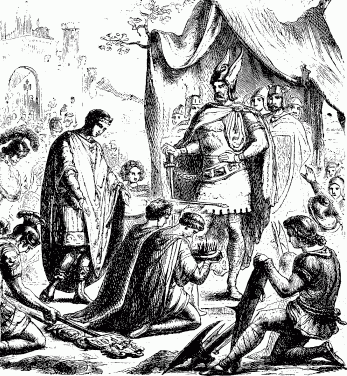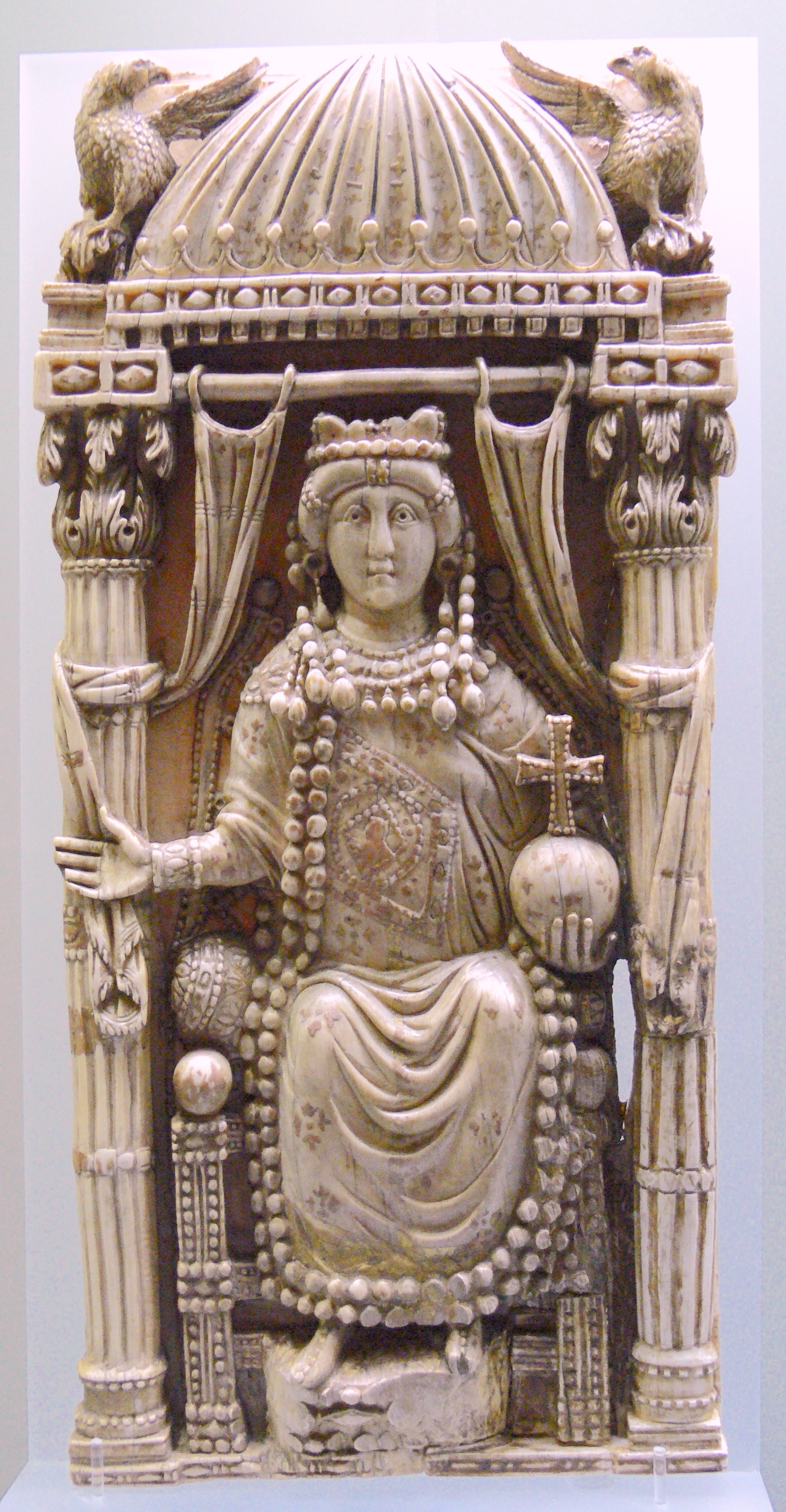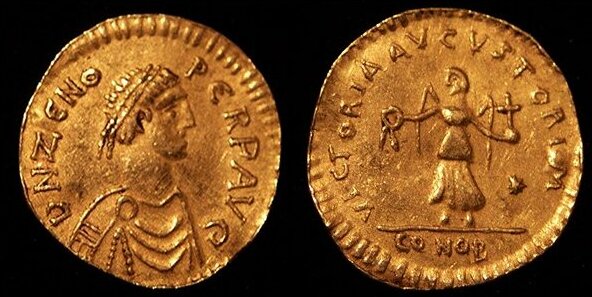|
476
__NOTOC__ Year 476 ( CDLXXVI) was a leap year starting on Thursday (link will display the full calendar) of the Julian calendar. At the time, it was known as the Year of the Consulship of Basiliscus and Armatus (or, less frequently, year 1229 ''Ab urbe condita''). The denomination 476 for this year has been used since the early medieval period, when the Anno Domini calendar era became the prevalent method in Europe for naming years. Because the fall of the Western Roman Empire occurred in 476, many historians consider it the last year of ancient history and the first year of the Middle Ages in Europe. Events By place Roman Empire * Summer – Odoacer, chieftain of the Germanic tribes ( Herulic/Scirian '' foederati''), visits the imperial palace at Ravenna. He petitions Orestes (''magister militum'') to reward his mercenaries for their services and their support of his rebellion a year earlier, by making good on his promise to grant them lands to settle permanently ... [...More Info...] [...Related Items...] OR: [Wikipedia] [Google] [Baidu] |
Western Roman Empire
The Western Roman Empire comprised the western provinces of the Roman Empire at any time during which they were administered by a separate independent Imperial court; in particular, this term is used in historiography to describe the period from 395 to 476, where there were separate coequal courts dividing the governance of the empire in the Western and the Eastern provinces, with a distinct imperial succession in the separate courts. The terms Western Roman Empire and Eastern Roman Empire were coined in modern times to describe political entities that were ''de facto'' independent; contemporary Romans did not consider the Empire to have been split into two empires but viewed it as a single polity governed by two imperial courts as an administrative expediency. The Western Roman Empire collapsed in 476, and the Western imperial court in Ravenna was formally dissolved by Justinian in 554. The Eastern imperial court survived until 1453. Though the Empire had seen periods wit ... [...More Info...] [...Related Items...] OR: [Wikipedia] [Google] [Baidu] |
Basiliscus
Basiliscus ( grc-gre, Βασιλίσκος, Basilískos; died 476/477) was Eastern Roman emperor from 9 January 475 to August 476. He became in 464, under his brother-in-law, Emperor Leo (457–474). Basiliscus commanded the army for an invasion of the Vandal Kingdom in 468, which was defeated at the Battle of Cape Bon. There were accusations at the time that Basiliscus was bribed by Aspar, the ; many historians dismiss this, instead concluding that Basiliscus was either incompetent or foolish for accepting Vandal King Gaiseric's offer of a truce, which the latter used to construct fireships. Basiliscus's defeat cost the Eastern Empire of gold, causing the empire to hover above bankruptcy for 30 years. When Basiliscus returned to Constantinople, he sought refuge in the Church of St. Sophia. His sister, Empress Verina, secured him a pardon and he left the church to retire in Neapolis. When Emperor Leo died in 474, his grandson Emperor Leo II (474) took power, but soon ... [...More Info...] [...Related Items...] OR: [Wikipedia] [Google] [Baidu] |
Odoacer
Odoacer ( ; – 15 March 493 AD), also spelled Odovacer or Odovacar, was a soldier and statesman of barbarian background, who deposed the child emperor Romulus Augustulus and became Rex/Dux (476–493). Odoacer's overthrow of Romulus Augustulus is traditionally seen as marking the end of the Western Roman Empire as well as Ancient Rome. Though the real power in Italy was in his hands, he represented himself as the client of the emperor in Constantinople, Zeno. Odoacer often used the Roman honorific patrician, granted by Zeno, but was referred to as a king ( la, rex) or duke ( la, dux) in many documents, so is not clear which was his actual charge. He himself used the title of king in the only surviving official document that emanated from his chancery, and it was also used by the consul Basilius. Odoacer introduced few important changes into the administrative system of Italy. He had the support of the Roman Senate and was able to distribute land to his followers withou ... [...More Info...] [...Related Items...] OR: [Wikipedia] [Google] [Baidu] |
Zeno (emperor)
Zeno (; grc-gre, Ζήνων, Zénōn; c. 425 – 9 April 491) was Eastern Roman emperor from 474 to 475 and again from 476 to 491. Domestic revolts and religious dissension plagued his reign, which nevertheless succeeded to some extent in foreign issues. His reign saw the end of the Western Roman Empire following the deposition of Romulus Augustus and the death of Julius Nepos, but he was credited with contributing much to stabilising the Eastern Empire. In ecclesiastical history, Zeno is associated with the '' Henotikon'' or "instrument of union", promulgated by him and signed by all the Eastern bishops, with the design of solving the monophysite controversy. The Henotikon was widely unpopular and eventually abandoned under Justin I. Biography Rise to power Early life Zeno's original name was Tarasis, and more accurately ''Tarasikodissa'' in his native Isaurian language ( la, Trascalissaeus).The sources call him "Tarasicodissa Rousombladadiotes", and for this rea ... [...More Info...] [...Related Items...] OR: [Wikipedia] [Google] [Baidu] |
Orestes (father Of Romulus Augustulus)
OrestesNo other names are known, according to J.R. Martindale ''The Prosopography of the Later Roman Empire'' vol. II pp. 811–812. Cambridge University Press, 1980 (died 28 August 476) was a Roman general and politician of Pannonian ancestry, who held considerable influence in the late Western Roman Empire. Biography Born to a Roman aristocratic family from Pannonia Savia, Orestes was son of Tatulus, a pagan, and son-in-law to Romulus, who served as ''comes'' in the Western Roman Empire. After Pannonia was ceded to Attila the Hun, Orestes joined Attila's court, reaching high position as a secretary (''notarius'') in 449 and 452. In 449 Attila sent him twice to Constantinople with ambassador Eslas.Priscus, ''History'', fragment 7.Priscus, ''History'', fragment 8. In 475, Orestes was appointed ''magister militum'' and '' patricius'' by Western Roman Emperor Julius Nepos. This proved to be a mistake on the part of Nepos. By 28 August 475, Orestes, at the head of the '' foede ... [...More Info...] [...Related Items...] OR: [Wikipedia] [Google] [Baidu] |
Middle Ages
In the history of Europe, the Middle Ages or medieval period lasted approximately from the late 5th to the late 15th centuries, similar to the post-classical period of global history. It began with the fall of the Western Roman Empire and transitioned into the Renaissance and the Age of Discovery. The Middle Ages is the middle period of the three traditional divisions of Western history: classical antiquity, the medieval period, and the modern period. The medieval period is itself subdivided into the Early Early may refer to: History * The beginning or oldest part of a defined historical period, as opposed to middle or late periods, e.g.: ** Early Christianity ** Early modern Europe Places in the United States * Early, Iowa * Early, Texas * Early ..., High Middle Ages, High, and Late Middle Ages. Population decline, counterurbanisation, the collapse of centralized authority, invasions, and mass migrations of tribes, which had begun in late antiquity, continued i ... [...More Info...] [...Related Items...] OR: [Wikipedia] [Google] [Baidu] |
Ravenna
Ravenna ( , , also ; rgn, Ravèna) is the capital city of the Province of Ravenna, in the Emilia-Romagna region of Northern Italy. It was the capital city of the Western Roman Empire from 408 until its collapse in 476. It then served as the capital of the Ostrogothic Kingdom until it was re-conquered in 540 by the Byzantine Empire. Afterwards, the city formed the centre of the Byzantine Exarchate of Ravenna until the last exarch was executed by the Lombards in 751. Although it is an inland city, Ravenna is connected to the Adriatic Sea by the Candiano Canal. It is known for its well-preserved late Roman and Byzantine architecture, with eight buildings comprising the UNESCO World Heritage Site "Early Christian Monuments of Ravenna". History The origin of the name ''Ravenna'' is unclear. Some have speculated that "Ravenna" is related to "Rasenna" (or "Rasna"), the term that the Etruscans used for themselves, but there is no agreement on this point. Ancient era The origins o ... [...More Info...] [...Related Items...] OR: [Wikipedia] [Google] [Baidu] |
Illus
Flavius Illus ( grc-gre, Ἴλλους or Ἰλλοῦς; died 488) was a Roman general, who played an important role in the reigns of the eastern emperors Zeno and Basiliscus. Illus supported the revolt of Basiliscus against Zeno, then switched sides, supporting the return of Zeno (475-476). Illus served Zeno well, defeating the usurper Marcianus, but came into conflict with the dowager empress Verina, and supported the revolt of Leontius. This rebellion failed and Illus was killed. Origins Illus ( grc-gre, Ἴλλους or ) was an Isaurian, but the time and place of his birth are unknown; he had a brother, called Trocundes. Illus is said to have held various offices under the Emperor Leo I (457—474), and to have been an intimate friend of Zeno, apparently before his accession. John Malalas considered Illus an uncle of Zeno. However, we first read of him in Zeno's reign, at a time during which he was hostile to Zeno. Under Basiliscus Basiliscus, brother of the dow ... [...More Info...] [...Related Items...] OR: [Wikipedia] [Google] [Baidu] |
Eastern Roman Empire
The Byzantine Empire, also referred to as the Eastern Roman Empire or Byzantium, was the continuation of the Roman Empire primarily in its eastern provinces during Late Antiquity and the Middle Ages, when its capital city was Constantinople. It survived the fragmentation and fall of the Western Roman Empire in the 5th century AD and continued to exist for an additional thousand years until the fall of Constantinople to the Ottoman Empire in 1453. During most of its existence, the empire remained the most powerful economic, cultural, and military force in Europe. The terms "Byzantine Empire" and "Eastern Roman Empire" were coined after the end of the realm; its citizens continued to refer to their empire as the Roman Empire, and to themselves as Romans—a term which Greeks continued to use for themselves into Ottoman times. Although the Roman state continued and its traditions were maintained, modern historians prefer to differentiate the Byzantine Empire from Ancient ... [...More Info...] [...Related Items...] OR: [Wikipedia] [Google] [Baidu] |
Italy
Italy ( it, Italia ), officially the Italian Republic, ) or the Republic of Italy, is a country in Southern Europe. It is located in the middle of the Mediterranean Sea, and its territory largely coincides with the homonymous geographical region. Italy is also considered part of Western Europe, and shares land borders with France, Switzerland, Austria, Slovenia and the enclaved microstates of Vatican City and San Marino. It has a territorial exclave in Switzerland, Campione. Italy covers an area of , with a population of over 60 million. It is the third-most populous member state of the European Union, the sixth-most populous country in Europe, and the tenth-largest country in the continent by land area. Italy's capital and largest city is Rome. Italy was the native place of many civilizations such as the Italic peoples and the Etruscans, while due to its central geographic location in Southern Europe and the Mediterranean, the country has also historically b ... [...More Info...] [...Related Items...] OR: [Wikipedia] [Google] [Baidu] |
Ancient History
Ancient history is a time period from the beginning of writing and recorded human history to as far as late antiquity. The span of recorded history is roughly 5,000 years, beginning with the Sumerian cuneiform script. Ancient history covers all continents inhabited by humans in the period 3000 BCAD 500. The three-age system periodizes ancient history into the Stone Age, the Bronze Age, and the Iron Age, with recorded history generally considered to begin with the Bronze Age. The start and end of the three ages varies between world regions. In many regions the Bronze Age is generally considered to begin a few centuries prior to 3000 BC, while the end of the Iron Age varies from the early first millennium BC in some regions to the late first millennium AD in others. During the time period of ancient history, the world population was already exponentially increasing due to the Neolithic Revolution, which was in full progress. While in 10,000 BC, the world population st ... [...More Info...] [...Related Items...] OR: [Wikipedia] [Google] [Baidu] |
Heruli
The Heruli (or Herules) were an early Germanic people. Possibly originating in Scandinavia, the Heruli are first mentioned by Roman authors as one of several " Scythian" groups raiding Roman provinces in the Balkans and the Aegean Sea, attacking by land, and notably also by sea. During this time they reportedly lived near the Sea of Azov. From the late 4th century AD the Heruli were one of the peoples that were brought into the fold of the Hunnic Confederation of Attila. By 454, after the death of Attila, they established their own kingdom on the Middle Danube, and Heruli also participated in successive conquests of Italy by Odoacer, Theoderic the Great, Narses and probably also the Longobards. However, their independent kingdom was destroyed by the Longobards by the early 6th century AD. A part of this population subsequently became established inside the Roman empire near Belgrade, and continued contributing fighting men to the Eastern Roman Empire, and participating in ... [...More Info...] [...Related Items...] OR: [Wikipedia] [Google] [Baidu] |






.png)


